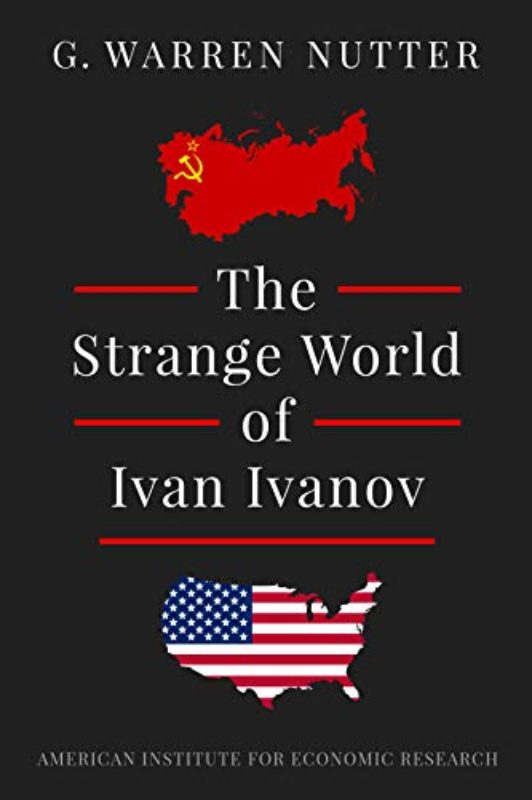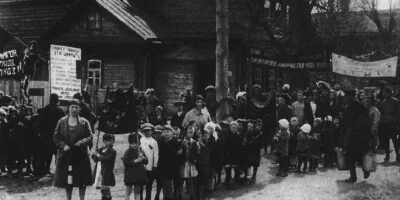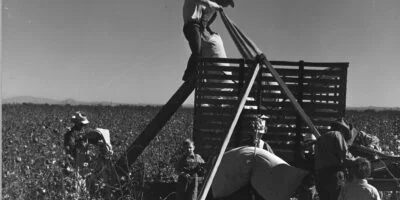The Soviet Economy Was Not Growing; It Was Dying

For much of the twentieth century, leading figures of the American academy looked upon the Soviet Union’s economic performance with what may be legitimately described as a sense of credulous envy. Although the Soviet economy was smaller than the United States’, the Soviets’ official numbers consistently projected a growth rate that would soon overtake their Cold War rival’s and, in doing so, validate the claimed inevitability of the socialist economic system on which it was built. Even as American economists rejected the Marxist philosophy behind Soviet planning, they settled into a curious postwar habit of disseminating economic projections that depicted the Soviet economy overtaking the United States in the near future.
Beginning with the 1961 edition of his bestselling economics textbook, Paul Samuelson included a graphic displaying the comparative growth rates of the American and Soviet economies. Per this forecast, the Soviet gross national product would overtake the United States at some point between twenty-three and thirty-six years in the future. Curiously, by the 1980 edition of the textbook this same graph had shifted forward by two decades so that the point of projected intersection would still take place between twenty-two and thirty-two years in the future. Similar claims appeared in competing textbooks from the time and generally transferred over into the specialist literature on the Soviet economy as well.[1]
At the midcentury mark, economist G. Warren Nutter (1923–79) provided one of the lone dissenting voices to challenge what had become a matter of conventional wisdom among Sovietologists. Whereas others perceived vibrancy and vitality in the socialist society’s industrial growth, Nutter recognized its long-term economic decline concealed behind a politically crafted veneer of propaganda about socialist industrial prowess.
From 1956 onward, he labored on providing a statistical corrective that painted a picture of a society gradually succumbing to the weight of its own central planning and the wasteful accretions of a graft-riddled and politically repressive bureaucracy.[2] The early reception of Nutter’s work expressed doubt about its accuracy compared to more optimistic portrayals from the textbooks and accompanying Sovietology literature, yet history proved him right. Nutter had scooped the field and accurately identified an economy with deep structural problems—most of them directly traceable to its destruction of a functional price mechanism through the tools of state management.
Nutter’s assessment was no abstraction, but rather the result of years of close study of the relationship between state policy and industrial concentration in the United States – the subject of his dissertation at the University of Chicago. But he also possessed an uncommonly keen eye for extracting observations from his surroundings. He deployed the latter during a twenty-eight-day visit to the Soviet Union in 1956 as a self-described “tourist” researcher, which he contrasted with other American experts whose longer visits occurred under the heavy scrutiny and management of handlers from the Soviet government[3].
Whereas others largely picked up on what the Soviets wanted them to see and incorporated curated factory tours and contrived statistical claims into their assessments, Nutter apparently had a knack for looking beneath the surface through everyday observations of his surroundings – simply by keeping an eye on the types of goods in the shop window, the patterns of workers entering the factory in the background, and the way that the people he encountered described even the most mundane economic transactions of their daily lives.[4]
He had no formal training in Russian and does not appear to have claimed fluency, describing his tour as having taken place “under the severe handicap of not knowing the language.”[5] Yet Nutter was also something of a linguistic autodidact—an ability he realized in the US Army during the liberation of Europe a little over a decade prior. In reading his travelogue, one gathers that he may have gleaned more from observing the surrounding conversations than he let on – more than, importantly, his Soviet guides realized at the time.
Born in Topeka, Kansas, to a Jewish mother who was widowed around the time of his birth, Nutter grew up in tight economic circumstances. His small family migrated around the Depression-era rural Midwest in search of stable income, eventually settling in Iowa. A promising student, he received a break to attend the University of Chicago, where he came under the mentorship of the economist Henry Simons as an undergraduate.
Nutter’s wartime service took him to the front lines of the European theater. He fought in the infantry during the invasion of Germany, directly witnessing the horrifying revelations that came with the liberation of the Nazi concentration camps. He returned to Chicago after the war with the intention of completing his graduate studies under Simons, but the latter’s untimely death and an existing acquaintance with law professor Aaron Director brought him under the guidance of a newly hired economics professor by the name of Milton Friedman. Graduating in 1949, he became Friedman’s first doctoral student to enter into academic life. After a brief stint on the economics faculty at Yale, he eventually settled at the University of Virginia, where he cofounded the Thomas Jefferson Center for the Study of Political Economy with his old Chicago classmate James M. Buchanan.
The dissolution of the Soviet Union, membership in a star-studded faculty that included two future Nobel Prize winners (Buchanan and Ronald Coase), and an untimely death from cancer in 1979 have somewhat overshadowed Nutter’s own substantial resume as a scholar. Curiously, as we mark thirty years since the fall of the Berlin Wall, political calls for socialism have regained fashionability on the far left. Rehabilitated by academics and activists who present themselves as “democratic” expositors of centralized planning, practitioners of the modern euphemized version are all too eager to dissociate their brand from its notorious and deadly twentieth-century iterations.
Thus the recent anniversary of Karl Marx’s two-hundredth birthday was met with an outpouring of editorials and academic commentaries celebrating the claimed relevance of the discredited philosopher’s theories for “solving” income inequality, climate change, and a slew of similar progressive political causes in the present day. The human toll imposed by his followers received comparatively little attention, as did the connection between this recurring pattern and the socialist philosophy that undergirds it.
Yet this year marks another anniversary that may, in part, provide a needed intellectual corrective to the misguided fancies of the ongoing socialist rehabilitation. Whereas Nutter’s earlier work on the Soviet Union consisted of detailed industrial analysis and number crunching suited for academic discussions among economists, in 1969 he turned his attention to the more practical matter of daily life under a socialist system of government.
The result was The Strange World of Ivan Ivanov, a short yet hard-hitting indictment of the economic and political repression that so often follows from attempts to structure a society around Marxist ideology and centralized economic planning.
Nutter began his work on Ivan Ivanov in 1967 as part of a debate with the Marxist historian Herbert Aptheker at the University of Western Ontario. As was a common theme at the time, Aptheker enlisted the history of racial segregation in the United States to build a sweeping indictment of “capitalism” as an economic system, including assigning it blame for inculcating racial and other forms of discrimination. Nutter’s rejoinder “I Choose Capitalism” is published here as an accompanying text to the book for the first time.
The counterargument did not shy from confronting the problem of racism in the United States. Yet as Nutter explained, discrimination appeared to be a persistent curse of the human condition. Far from solving this problem, the socialist approach of the Soviets had actually systematized it into the instruments of the state.
Noting that state action carries with it a far greater degree of coercive power, Nutter reframed the question of discrimination by asking his audience to judge a society on whether it availed the individual of a means to escape the very same instruments. In the Soviet Union, state policy had become a means of carrying out anti-Semitic and other ethnic persecutions under the guise of economic redistribution, property appropriation, and even genocidal persecutions and famines. Though Nutter avoided implicating his opponent by name, Aptheker himself had weathered the Stalin years as something of an apologist for the Soviet state’s most notorious atrocities.
The cheerful depictions of life under socialism that the Marxist intellectual presented amounted to a political sleight of hand. They entailed a false comparison between an idealized form of egalitarian socioeconomic organization, as proposed on the far left but never realized, and the observed faults of Western capitalism as it existed. Aptheker was comparing a constructed socialist fantasy to a disliked capitalist reality and declaring that fantasy the victor on account of its unrealized promises. Yet as Nutter stressed, the reality of life under socialism often reduced society to abject impoverishment and immiseration.
Far from being “solved” by socialism’s promises, discrimination on ethnic and religious lines, along with deeply inegalitarian political distributions of resources and power, were endemic features of the Soviet system. Even as these features also manifested in the West through private and state-sanctioned discrimination, capitalism itself was an escape mechanism to the very same problems that the Soviet state, through its absolute and uncontested control of social life, denied. A socialist economy is inescapably dependent upon political mechanisms to allocate scarce resources, whereas a capitalist society offers an escape from politics through voluntary market exchange.
Shortly after the debate, Nutter shared a written transcript of his comments with William F. Buckley, indicating he would likely “toss them in the wastebasket” if the conservative editor of National Review could find no use for them.[6] Nutter’s papers contain few clues as to why he changed his heart, but within a year’s time he had expanded the transcript into a series of lectures on how the Soviet government treated its ordinary citizens. He delivered one version the following year at a conference for the American Bar Association.[7] At some point shortly thereafter, David Appel, a features editor at the Philadelphia Inquirer, approached the economist about developing the lectures into a multipart series on daily life in the Soviet Union. Nutter composed ten articles for the paper, drawing on the previous two decades of his research and developing its implications for Ivan Ivanov, a generic Soviet counterpart to the American John Doe. After the series ran in March 1968, he compiled its contents and edited them into the present manuscript.
The book’s publication came shortly after Nutter accepted an appointment as assistant secretary for international security affairs in the Department of Defense. In part, the government appointment proved to be his own exit strategy from a devolving political climate at the University of Virginia. A few years prior, an increasingly hostile university administration began the systematic dismantling of the economics department after faculty in other departments deemed it overly “conservative.” Coase had been chased away to the University of Chicago by a hostile dean who denigrated his academic work and impeded his promotion through the department. Buchanan left in protest the previous year after the university blocked the promotion of their widely published colleague Gordon Tullock. Nutter simply took a leave from his academic post and would return to the department after his service concluded, although the department was only a shadow of its most vibrant years in the late 1950s and early 1960s.
In a sense, Ivan Ivanov provided something of a final capstone for the broader scholarly project that emerged from the Thomas Jefferson Center during its heyday. In addition to the aforementioned faculty affiliates, this unique academic convergence had cultivated a generation of new scholars steeped in price theory, birthed the public choice subfield, and produced dozens of seminal works on economic theory and its political dimensions—Nutter’s empirical analysis of the Soviet economy among them.
Though generally well-received in the Cold War environment of its publication, Ivan Ivanov, unfortunately, drifted from memory along with its own Soviet subject matter. In this new edition, we aim to make this text accessible again – both as a record of the daily personal hardships experienced under an actual Marxian-socialist state and a warning for a time when socialism’s reputation has become detached from its own track record. The poverty, fear, and coerced subordination of Ivan Ivanov’s life were not aberrations of a socialist revolution gone astray – they were the entirely predictable results of that same socialist system. And as its human toll stretches from the Eastern Bloc to China to Cuba to Venezuela, they continue to repeat with alarming certainty whenever and wherever socialism is attempted.
[1] Levy, David M., and Peart, Sandra J. “Soviet growth and American textbooks: An endogenous past.” Journal of Economic Behavior & Organization 78.1-2 (2011): 110-125.
[2] Nutter, G. Warren. “Some observations on Soviet industrial growth.” The American Economic Review 47.2 (1957): 618-630; Nutter, G. Warren, Israel Borenstein, and Adam Kaufman. “Growth of industrial production in the Soviet Union.” NBER Books (1962).
[3] Levy, David M., and Peart, Sandra J. “G. Warren Nutter’s “Traveler’s tale of the Soviet economy”: A witness to the actual world.” The Review of Austrian Economics 28.4 (2015): 397-404.
[4] Ibid
[5] Nutter, G. Warren. “A Traveler’s Tale of the Soviet Economy.” September 1956. Manuscript located at the Dwight D. Eisenhower Presidential library. Acknowledgement and thanks to David M. Levy, who provided me with a copy.
[6] Nutter to Buckley, May 3, 1967. William F. Buckley Papers, Yale University.
[7] Nutter, G. Warren. 1969. “Economic Aspects of Freedom,” in Liberty under Law, Anarchy, Totalitarianism. American Bar Association, Standing Committee on Education About Communism.











